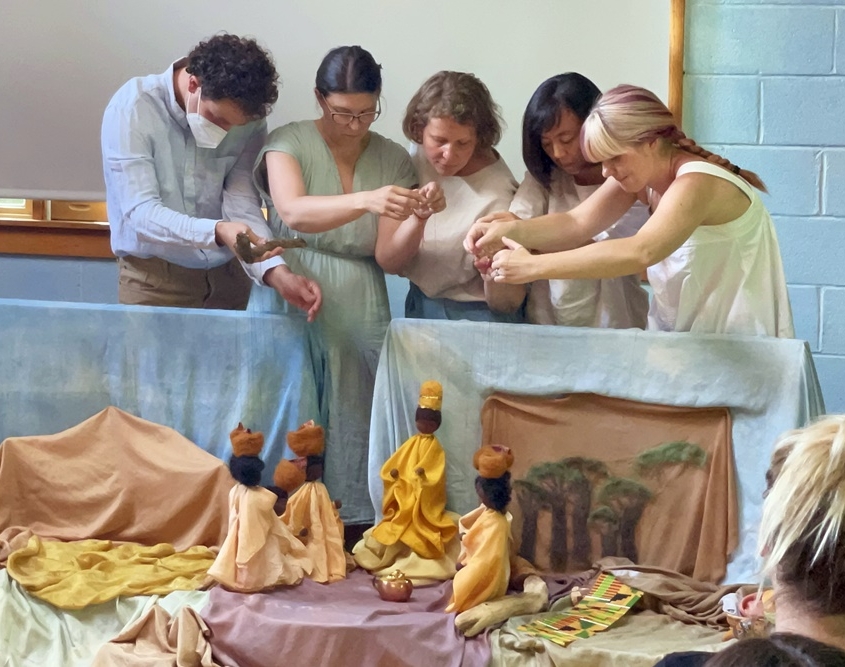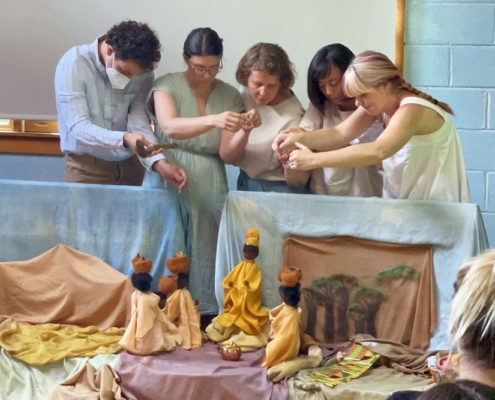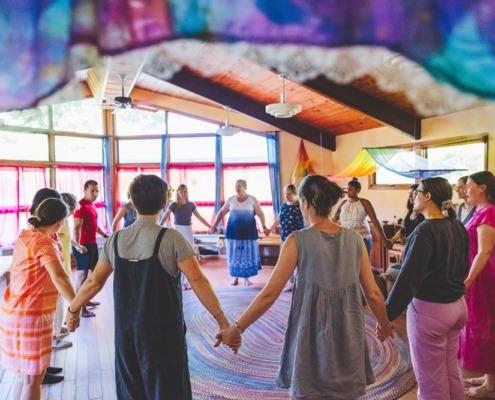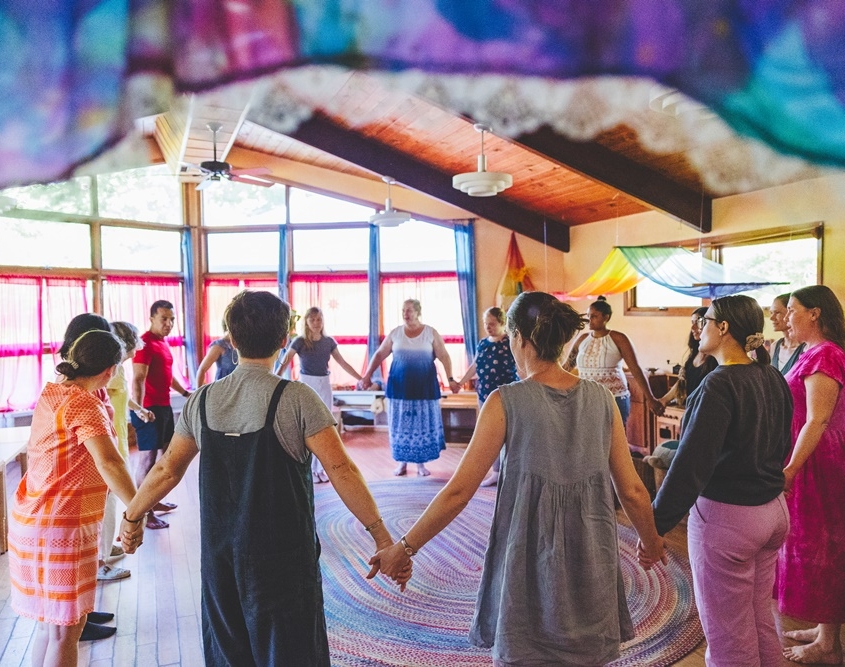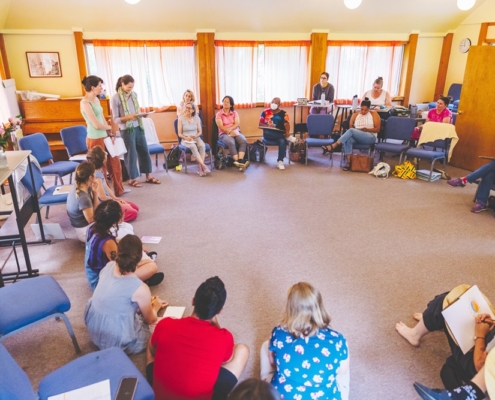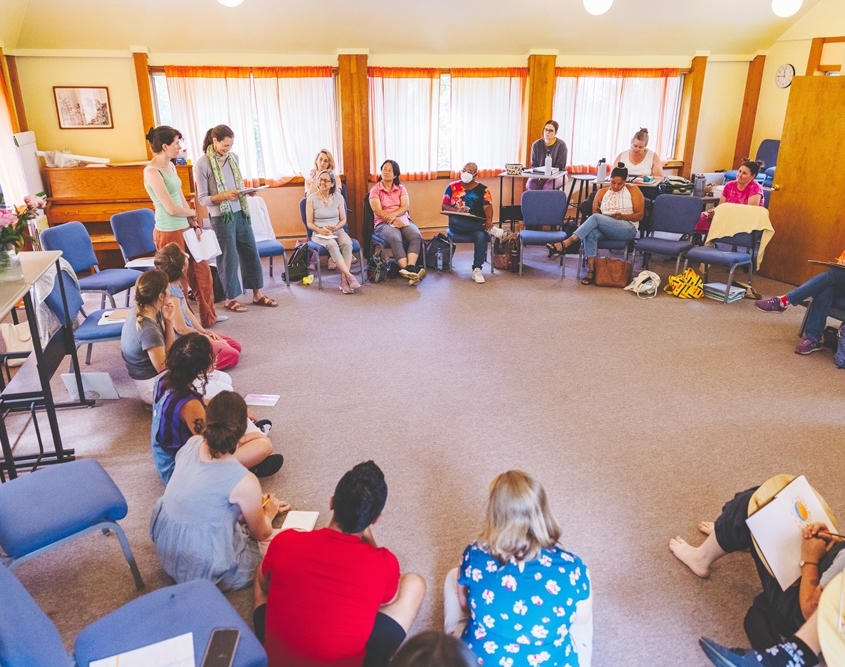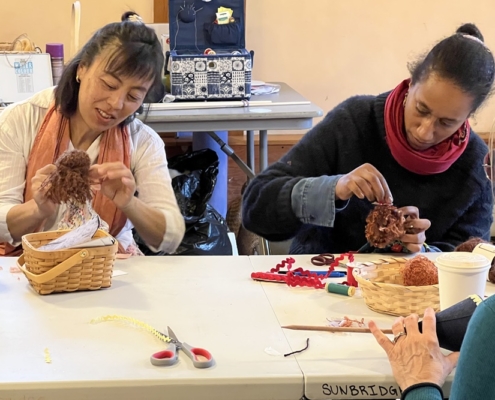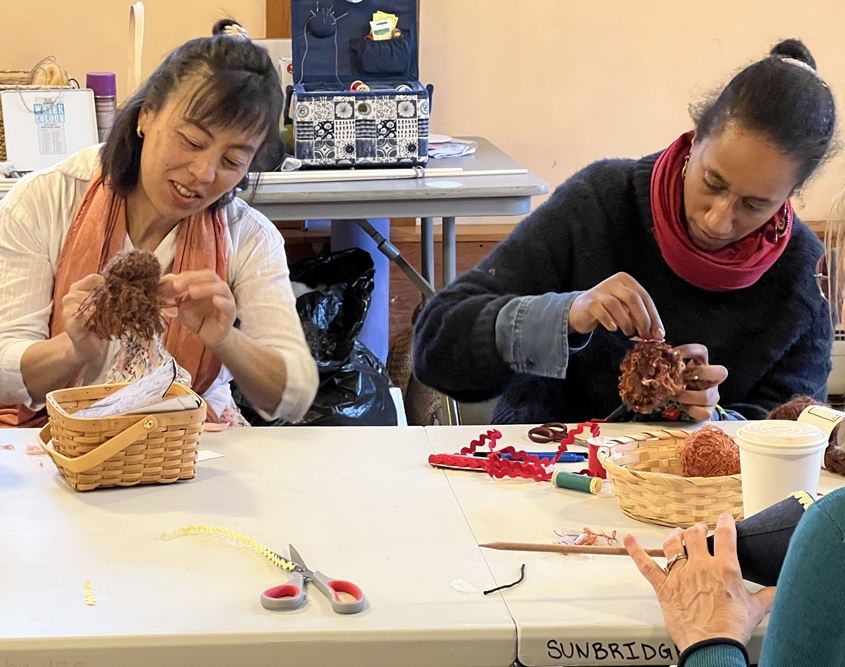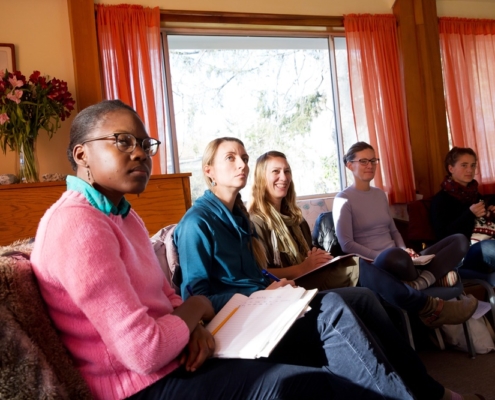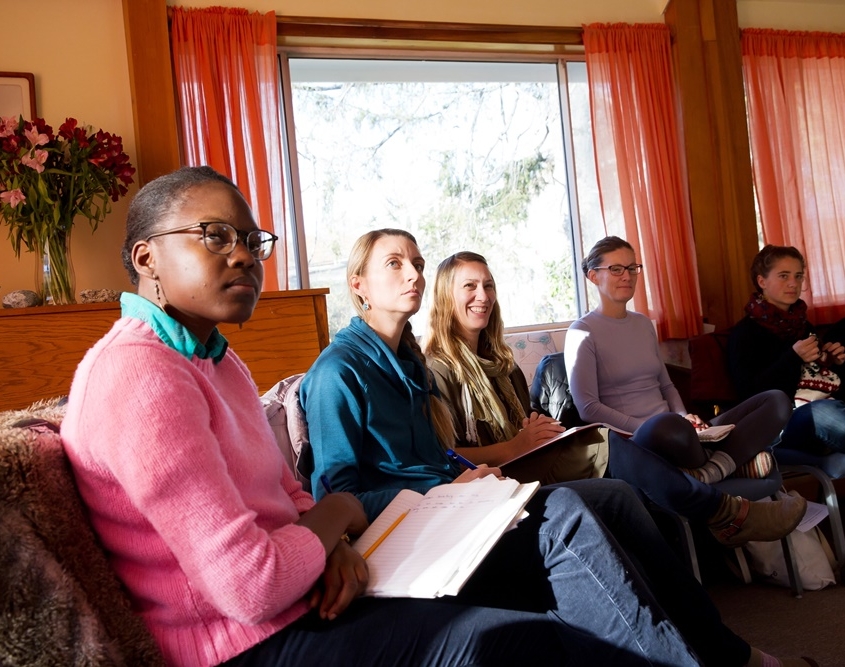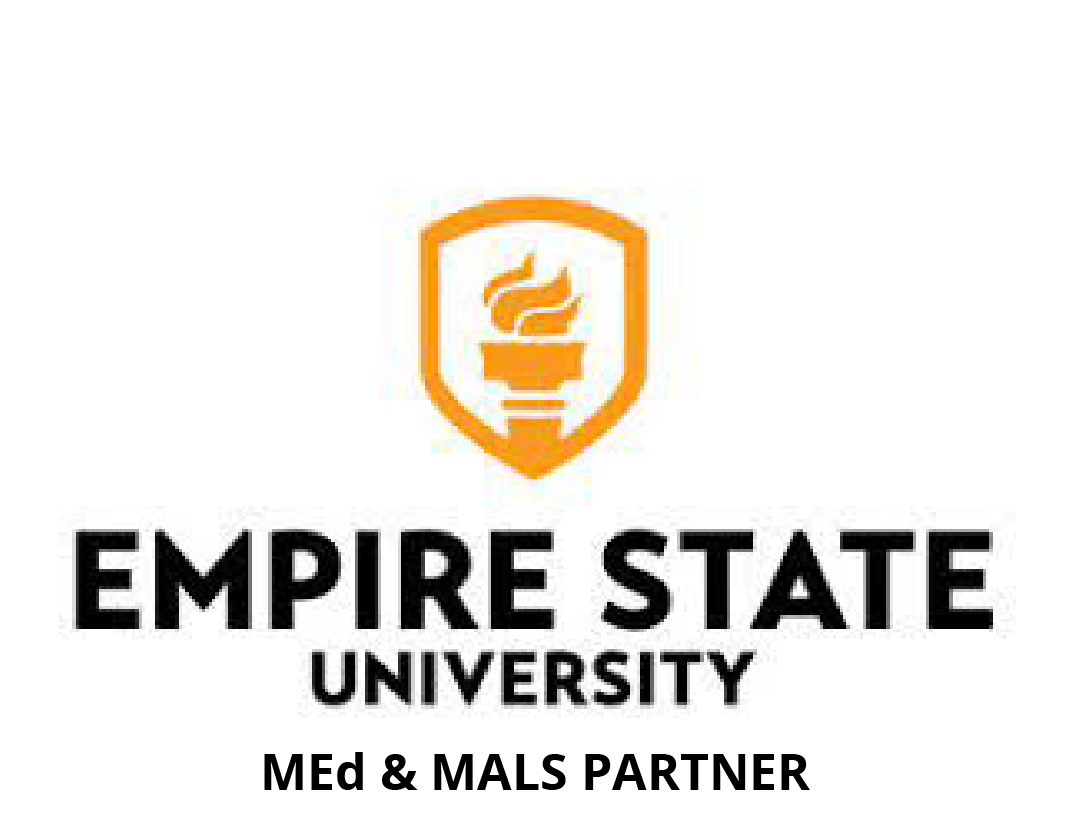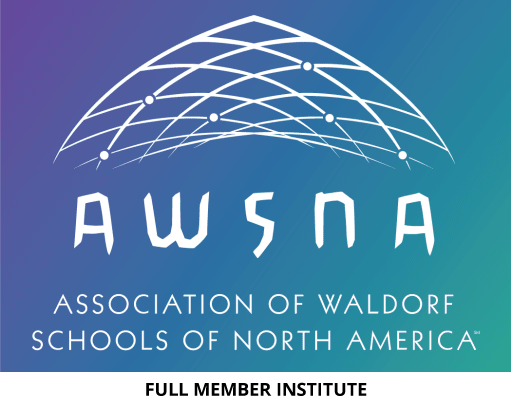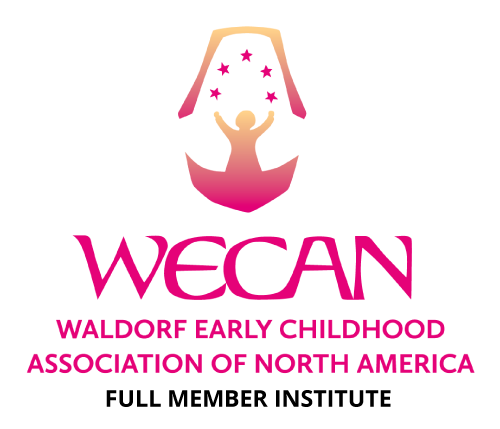Sunbridge Institute’s Waldorf Early Childhood Teacher Education program provides a philosophical, artistic, and practical foundation for Waldorf early childhood teaching. This low-residency program—held primarily on-campus, with occasional online evening classes taking place between in-person sessions—encompasses early childhood development from pre-birth to school entrance and explores diverse approaches to Waldorf early childhood education, from parent-child work to nursery and kindergarten teaching and extended care.
Directors: Nancy Blanning and Leslie Burchell-Fox, MSEd ’96
NEW!! Starting in 2025, this program will now enroll every summer. The next cohort enters June 15-July 4, 2025. Applications are now available. See Apply for application requirements and process.
Come to our April 30th virtual Meet & Greet to learn more.
Highly experienced Waldorf early childhood educators with significant relevant prior coursework may qualify to apply for our Early Childhood Completion Track.
“What stands out most for me now is consistent with what stood out for me on the very first day of classes: that this was going to be a profoundly richer experience than the mere practical accreditation I had been anticipating.”
– Sunbridge Early Childhood Teacher Education student
WECAN Standards & Sunbridge Diploma
Sunbridge Institute is a full member institute of WECAN (Waldorf Early Childhood Association of North America). Completion of a full WECAN-recognized Waldorf early childhood teacher training program is generally a pre-requisite of employment for Waldorf early childhood educators who carry responsibility for the care and education of children from birth to school entrance.
Sunbridge’s 495-hour program (exclusive of fieldwork and mentored teaching) meets—and exceeds—WECAN’s minimum expectation of 450 class contact hours, plus mentored teaching or extensive fieldwork or internship experiences, for lead nursery, pre-school, and kindergarten teachers, extended care providers, and parent-child class leaders in Waldorf schools and early childhood settings. Our program’s course offerings are also consistent with IASWECE guidelines (International Association for Steiner/Waldorf Early Childhood Education).
Please note that Sunbridge diplomas are not academic degrees, as they reflect clock hours, not credits. Due to fluctuations and variations from state-to-state in the U.S. regarding requirements for teaching credentials, it is important you research your state’s regulations regarding requirements to be licensed to teach in a private or public school.
Watch “Becoming…,” a Waldorf 100 film, produced in association with the International Association for Steiner/Waldorf Early Childhood Education, on early childhood around the world.
The Program Experience
A low-residency program taking place over the course of three summers and two intervening school years, with a three-week intensive each summer and a one-week intensive each fall and spring, the Sunbridge Early Childhood program is designed to accommodate a myriad of work schedules and backgrounds. Sunbridge students who are actively working with young children in a Waldorf setting will find that by blending their child-based work with their time in a Sunbridge classroom each experience enriches the other—their program coursework, assignments, and projects supporting and deepening their work with young children and their work with young children expanding and informing their experience as a teacher education student. Sunbridge students who are not yet Waldorf early childhood educators will find myriad opportunities for observing and working with young children throughout the course of their Sunbridge studies and are encouraged to enrich their Sunbridge experience with as much exposure as possible to Waldorf classrooms in action.
Our program directors are national and international leaders in the field of Waldorf early childhood education, bringing many years of practical Waldorf classroom experience and many years as adult educators to their Sunbridge teaching. In addition to our program directors, who also function as core faculty members, we regularly bring in adjunct and visiting faculty for further enrichment, providing you with a rich and comprehensive education.
Graduates are conferred a diploma in Waldorf Teacher Education. For those students and graduates who qualify, an opportunity to be fast-tracked toward earning a fully-accredited master’s degree is possible through Sunbridge’s partnership with SUNY Empire State University.
Entrance Requirements
This program welcomes applications from both in-service and pre-service teachers. All applicants must have earned a high school diploma, be familiar with Waldorf education and anthroposophy (although a Foundation Studies background is not required), and be able to satisfy your fieldwork requirements during the course of the program. See our Apply page for full details.
Key Program Goals
It is expected that this program will prepare students to:
• Understand the unfolding development of the child from pre-birth to age seven in the context of broader human development
• Provide young children with consistent experiences of the natural and human world through the rhythm of the day, week, seasons, and year
• Provide and engage in artistic activities such as storytelling, drawing and painting, sculpture and woodcarving, music and rhythmic games to foster creativity and imagination
• Understand and work with the philosophy and contemplative practices of Rudolf Steiner in their own preparation and practice
• Regard—and practice—the art of the educator as a lifelong opportunity for research
Program Components
Length
Sunbridge’s Early Childhood Teacher Education program is divided into seven terms:
| FIRST YEAR | SECOND YEAR | THIRD YEAR | |
|---|---|---|---|
| Summer | Three Weeks | Three Weeks | Three Weeks |
| Fall | One Week | One Week | |
| Spring | One Week | One Week |
Unless physical distancing necessitates otherwise, all sessions are held on campus.
Curriculum
Classes include the following areas:
- Child development and Waldorf education
- Anthroposophical studies and human development
- Artistic and handwork activities of Waldorf early childhood education
- Professional and social aspects of Waldorf early childhood education
- Inner development of the educator
Coursework
In addition to in-person classes, students complete study assignments and independent projects, as well as attend some online evening classes, between sessions.
Fieldwork
For the purpose of our fieldwork requirements, “in-service” refers to Sunbridge students who are:
- Working as lead or assisting teachers AND
- Actively working at least three days a week AND
- Working in a WECAN/AWSNA-affiliated early childhood setting (including WECAN-affiliated ho
me-based programs)
Sunbridge students who are in-service teachers are required to complete a total fieldwork experience of three weeks (lead teachers) and four weeks (assisting teachers) during the length of the Sunbridge program. Sunbridge students who are pre-service teachers are required to complete a total fieldwork experience of eight weeks. This experience is comprised of the following observation and student teaching requirements:
Observation Requirement: In-Service Teachers
During the length of the Sunbridge program, in-service students are required to observe in a WECAN/AWSNA affiliated Waldorf school for five days: three in the three early childhood classrooms (Birth-3, Nursery, and Kindergarten), one in a grade school classroom (1-8), and one in a high school classroom. Students may choose to observe all five days in one school, or to observe in different schools. The five days need not be consecutive, but three of those days must occur in the first year. All observations must take place in classrooms other than the student’s own. Students are encouraged to visit and experience other Waldorf schools as often as possible.
Observation Requirement: Pre-Service Teachers
During the length of the Sunbridge program, pre-service students are required to observe 10 days in a WECAN/AWSNA affiliated Waldorf school, five days of which must occur during the first year; these observations must include at least five days in the early childhood classrooms (Birth-3, Nursery, and Kindergarten), two in a grade school (one in grades 1-4, 1 in grades 5-8) and one in a high school classroom. The observation days need not be consecutive. Students may choose to observe in one school, or in different schools.
In addition to the required observations, students are encouraged to visit and experience Waldorf schools as much as possible and especially to have regular exposure to a WECAN/AWSNA early childhood setting. We particularly encourage pre-service teachers to familiarize themselves with Waldorf early childhood settings prior to entering our program.
All students are required to keep a journal of their observations and submit the journal to their advisor for review. All observation experiences must include Birth-3, Nursery, and Kindergarten.
Student Teaching Requirement: In-Service Teachers
Over the course of their studies, in-service students who are currently practicing as lead teachers are required to complete two weeks of student teaching. Each week (made up of five consecutive days) needs to be in a classroom other than their own. In-service students who are currently practicing as assisting teachers are required to complete two weeks of student teaching: one week (five consecutive days) in their own class and one week (five consecutive days) in a class other than their own. In addition, in-service assisting teachers are required to complete one week (five days, which need not be consecutive) of observations in an early childhood classroom/s other than their own; this observation week is in addition to the five observation days required during the first year.
Student Teaching Requirement: Pre-Service Teachers
Over the course of their studies, pre-service students are required to do a total of six weeks of student teaching under the guidance of a highly experienced teacher in a WECAN/AWSNA affiliated school.
All students may complete their fieldwork requirements the year following the fulfillment of the required coursework.
Certificates for completion of coursework will be issued at commencement and the final certificate will be issued upon the fieldwork completion.
Mentoring
Each in-service student is assigned a faculty mentor—a master Waldorf early childhood educator who will visit the student in their work with young children for two consecutive days each year to offer support and guidance in practical aspects of their work and in their development as an educator. These visits are accompanied by two hours of telephone conferences as a precursor and/or follow-up to the visit.
Enrollment Requirement for Pre-Service Teachers
In order to provide these individuals with an essential foundation for their Sunbridge studies, all incoming pre-service teachers are required to attend an online orientation to Waldorf early childhood education. Our 2025 online orientation (or “primer”) takes place May 30-31.
Master’s Degree
Successful completion of their Sunbridge studies enables our Early Childhood program students and graduates who hold a bachelor’s degree from a regionally-accredited institution to receive 12 credits toward a 30- or 36-credit, fully-accredited SUNY master of education or master of arts in liberal studies degree with self-designed concentration in Waldorf education, through our partnership with Empire State College of the State University of New York.
2024-2025 Academic Calendar
Summer 2024 Session
Sunday, June 16 – Friday, July 5
Fall 2024 Session
Sunday, November 17 – Friday, November 22
Spring 2025 Session
Sunday, March 16 – Friday, March 21
2025-2026 Academic Calendar
Summer 2025 Session
Sunday, June 15 – Friday, July 4
Fall 2025 Session
Sunday, November 16 – Friday, November 21
Spring 2026 Session
Sunday, March 15 – Friday, March 20
For Further Assistance
Please see our Teacher Education Program Overview for more information on Waldorf teacher education at Sunbridge Institute.
If you have any questions, please contact us or call our Admissions Office at 845-425-0055 x20.
Please Note: Sunbridge Institute Waldorf Teacher Education programs and intensives are recognized by AWSNA, the Association of Waldorf Schools of North America, and are licensed by BPSS, the Bureau of Proprietary School Supervision of the New York State Education Department. These offerings do not lead to New York State teaching certification.
Sunbridge Institute reserves the right to cancel or change any offering at any time and to make faculty or course substitutions when necessary.


